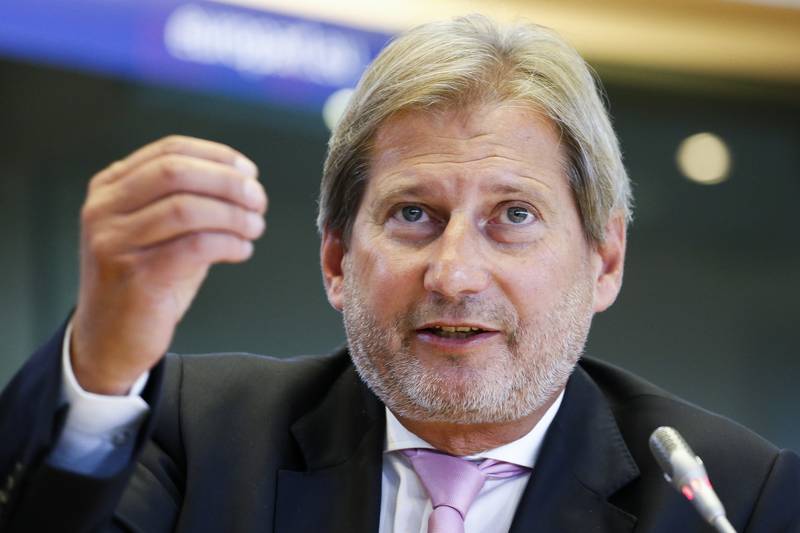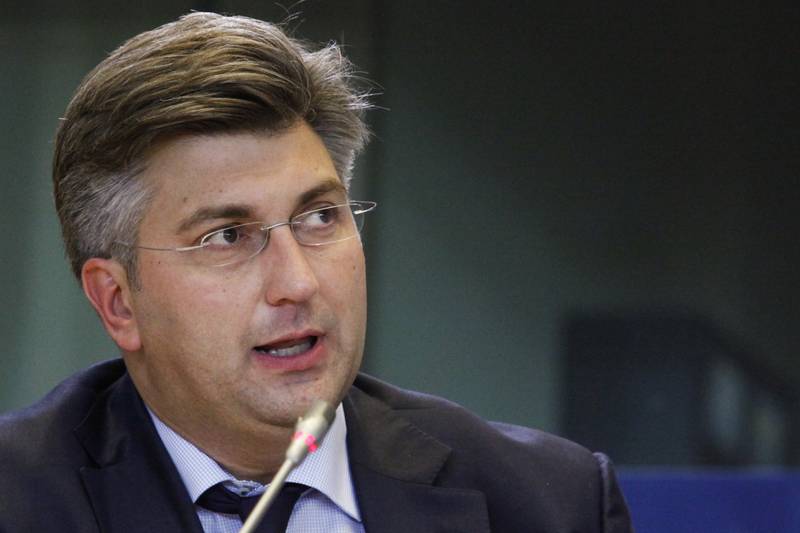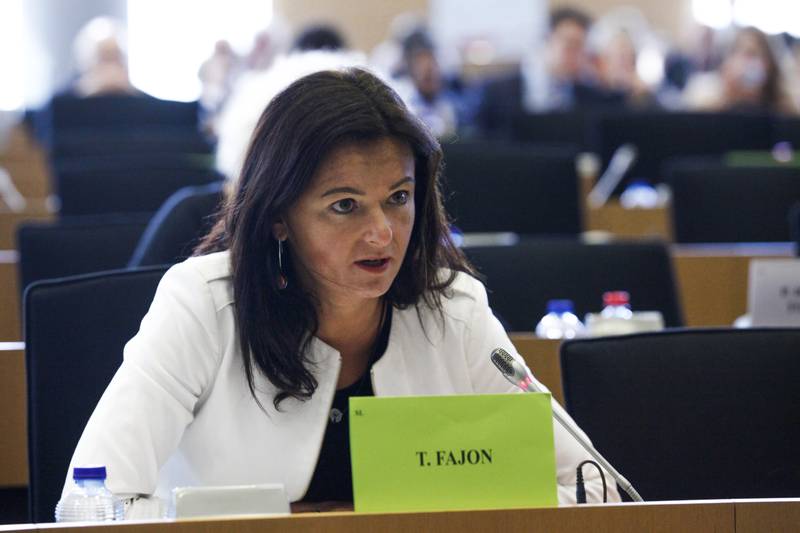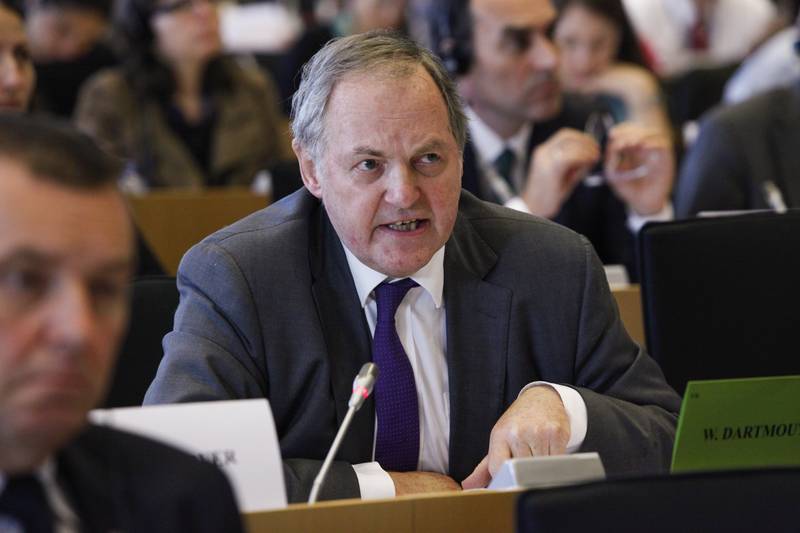Enlargement Will Never Be the Same Again
Adelina Marini, October 5, 2014
 One of the much anticipated hearings of candidates for European Commissioners was that of Johannes Hahn (Austria) who is bound for a second term. Jean-Claude Juncker entrusted him with a very important portfolio that provoked very strong emotions and debates - European Neighbourhood Policy and Enlargement Negotiations. It is the second part of the title that caused serious polemics because it no longer means enlargement in general, but a focus only on the negotiations. And although Johannes Hahn gave many answers during his 3-hour-long hearing in the foreign affairs committee of the European Parliament, some questions remained unanswered. For example, what will happen to the countries that have a candidate status but no negotiations have been opened yet? Macedonia is such a case. The former Yugoslav republic received a candidate status back in 2005 together with Croatia and Turkey. Since then, Croatia has become a full-fledged member of the EU, while the European Commission has recommended to the Council five years in a row to give a green light for the start of negotiations with Macedonia but Greece always vetoes it.
One of the much anticipated hearings of candidates for European Commissioners was that of Johannes Hahn (Austria) who is bound for a second term. Jean-Claude Juncker entrusted him with a very important portfolio that provoked very strong emotions and debates - European Neighbourhood Policy and Enlargement Negotiations. It is the second part of the title that caused serious polemics because it no longer means enlargement in general, but a focus only on the negotiations. And although Johannes Hahn gave many answers during his 3-hour-long hearing in the foreign affairs committee of the European Parliament, some questions remained unanswered. For example, what will happen to the countries that have a candidate status but no negotiations have been opened yet? Macedonia is such a case. The former Yugoslav republic received a candidate status back in 2005 together with Croatia and Turkey. Since then, Croatia has become a full-fledged member of the EU, while the European Commission has recommended to the Council five years in a row to give a green light for the start of negotiations with Macedonia but Greece always vetoes it.
During the hearing of the Austrian candidate, who has held in Barroso's second Commission another important portfolio - regional policy - emerged as a defender of the thesis that everything is in the hands of the candidate countries. The slogan of his term will be "quality over speed". This could sound strongly discouraging, especially at a time of huge geopolitical tensions and pressures, but it is entirely aimed at preventing deepening of the tensions within the Union. What is called by many a "need to digest enlargement", in Jean-Claude Juncker's vision about Johannes Hahn's portfolio there is a "need for consolidation". While the consolidation is going on inside, the main task of the Commissioner for neighbourhood policy and enlargement negotiations will be to prepare the candidate countries as best as possible.
Rule of law and fundamental rights, economy, true democracy
Those are the three pillars Johannes Hahn will be building his policy toward the candidate countries upon, but also toward the countries in the near neighbourhood with which EU wants closer and long-term stable relations. Given the magnitude of the changes these three pillars demand, not only in the next five years but in much a longer time the candidate countries will not be able to fulfil the criteria. And this is no longer only Bulgaria's and Romania's fault, who were accepted in 2007 unprepared. It is now Hungary's fault as well for being a permanent source of provocations to the way the EU treats its principles and values. These three pillars are not new essentially and do not suggest significant changes of approach. However, there is a change and it will be tangible.
Johannes Hahn repeated many times during his audition that, to him, quality is essential. This means that he would not accept paper reforms. But if we start from Hungary's example, verifying a deeply rooted rule of law and sincere respect for fundamental rights could take a lot of time. And it will still not guarantee that some day in the future voters will not elect a government with authoritarian aspirations. On the first pillar, Mr Hahn will work closely with the first vice president of the European Commission, Frans Timmermans, who will be responsible for the rule of law and fundamental rights, and with the Czech Commissioner Vera Jourova entrusted with the Justice, Consumers and Gender Equality portfolio. To Johannes Hahn, dealing with organised crime and corruption, the reform of the public administration, independent and professional judges are things he said he would never compromise with.
Bearing in mind the experience from Bulgaria's and Romania's accession as well as from the development of the European integration process in the Western Balkan countries, the first pillar will be a very serious challenge for them. Some MEPs feared that if too extended in time, the preparatory process could force some of the candidates to give up. The Commissioner-designate said that the main goal is achieving a true and deep democracy, meaning irreversible. Besides, in the member states the fatigue from enlargement and the EU itself has reached critical levels and that is why time will be needed, and also strong arguments, to convince the European citizens that they will benefit from enlargement. And as if to illustrate that fatigue, British MEP William Dartmouth, from the party that endangered the political status quo in the UK - Nigel Farage's UK Independence Party - asked the Commissioner-designate if he had noticed that rich countries like Iceland and Norway refuse membership while only the poor countries push for accession.
The second pillar is also a big challenge, but it is directly related to the work on the first. As of this year, for the countries from the Western Balkans will be launched a light form of the European semester the purpose of which is to help them put in order fundamental for the economy problems, like budget planning, efficient management of public spending, ensuring budget revenues, transparency, efficient administration, removing nepotism from the power and administration, investment in education, etc. Johannes Hahn said in his introduction in front of the MEPs that his main goal will be to use the experience from the European semester and to ensure that the enlargement criteria will be formulated in such a way that will help the candidate countries reach the standards they will need as members. Increasing prosperity will seriously enhance the positive attitude toward the European integration process in these countries where these attitudes are now on a negative trend.
The economy will be a huge challenge not only for the candidate countries but for the Commission as well because it will have to avoid applying the results from the European semester as a model on them. The Western Balkan countries are to a large extent former Yugoslav republics, which have issues with a common denominator. Therefore, the work on the European semester with Croatia and Slovenia could be a good foundation.
The third pillar is true and deep democracy. The very title of the priority reveals serious doubts in the depth and the genuineness of the democracy in countries from past enlargements. To achieve this goal, Johannes Hahn committed to work closer with the civil society. He had answers to all the questions related with the severest problems the Western Balkan countries are facing - dependent media, lack of understanding of the fundamentality of human rights, lack of understanding of the rule of law, corruption  and organised crime. His performance in the foreign affairs committee made it clear that he will be relentless and no country will get any concessions, excluding Bosnia and Herzegovina.
and organised crime. His performance in the foreign affairs committee made it clear that he will be relentless and no country will get any concessions, excluding Bosnia and Herzegovina.
But his statements did not make it clear whether he foresees serious changes in the negotiations process. On one of the key issues about the independence of media in the region, the Austrian candidate said that these issues were treated in chapters 23 and 24, which are now opened first and will be closed last. The same is the situation with the archives of the former Yugoslav secret service (UDBA) which is a major issue in the work of Bulgarian MEP Andrey Kovatchev (EPP). He asked Johannes Hahn what he thought about lustration and the opening of UDBA archives and was assured that these issues would be included in the negotiations. Hahn urged, though, to avoid selective justice.
Serbia - the biggest challenge
Three hours were definitely not enough to reveal all of Mr Hahn's views, but as insufficient as it was what he said was enough to make some conclusions. Slovene MEP Tanja Fajon (Socialists&Democrats) asked him about his approach toward Serbia which is refusing to accept the European measures against Russia and how would he convince the member states that are in a similar situation. Those are mainly former communist countries. Johannes Hahn's answer suggests that Serbia will be taken out in a separate tier in the enlargement process. "The fact that Serbia did not follow the EU's position is something we need to discuss. This will take time", he explained. This could mean several things. On the one hand, it could be an attempt to buy time until the situation is clarified. But it could also mean that the issue will be a subject of serious negotiations both with Serbia itself and the Council.
The case is very serious and goes far beyond the portfolio of a single commissioner, but it is an issue that should be resolved as quickly as possible. May be, indeed, the time has come for a special summit to agree on a common position on Russia with candidate countries also present. The strategic guidelines the leaders agreed in June are highly insufficient against the backdrop of Russia's growing influence in the region. For now, Johannes Hahn's mandate envisages, in close cooperation with High Representative Federica Mogherini, to move the dialogue with Serbia forward. A basic principle in the implementation of this task will be to show Russia that it should not underestimate EU's resolve to defend its principles and to make the Kremlin understand that the neighbourhood policy is not aimed against Russia. Given the quality of the dialogue with Moscow at the moment, this will be a very difficult task. What Johannes Hahn, but Federica Mogherini too, should bear in mind is that the dialogue with Russia is directly related to the relations the EU will build with Serbia.
Currently, Belgrade is split between its desire to join the EU as fast as possible and its fear not to spoil its relations with the Kremlin. It must be quite telling for the EU that President Vladimir Putin will arrive in Belgrade on 16 October. During his visit he will also meet Miroslav Dodik, the president of Republika Srpska, which is part of the Bosnia and Herzegovina federation. The fact that, at least for now, no meetings are envisaged with other federal representatives but only with the Serbian part, is very telling of the problems the EU already has. Especially against the backdrop of the fact that the EU will  focus on quality instead of speed, it will be very important Hahn to find the right formula that will keep Serbia's interest on the European integration process and to work to detach Serbia from Russia.
focus on quality instead of speed, it will be very important Hahn to find the right formula that will keep Serbia's interest on the European integration process and to work to detach Serbia from Russia.
The work he committed to on improving the infrastructural connectivity within the region and with the EU is a step in the right direction, but it is totally not enough, taking into account the fact that Russia owns a huge part of Serbia's energy infrastructure, which is a strong instrument for pressure. Johannes Hahn will make a mistake if he bets on the approach "let them choose a side" because Serbia is of huge geopolitical significance not only for the region but for Southeastern Europe as well. And in this case it is important how does Russia view the region - as a sphere of influence.
Toward a new Bosnia and Herzegovina?
The most important news from Johannes Hahn's hearing, with the least details though, was that EU should move from a "Dayton logic to Brussels logic". He did not elaborate on the topic which leaves a broad field for interpretations. A possible thesis is that Johannes Hahn admits that the Dayton agreement is exhausted as a formula, on which there is growing consensus in the region, and that a new process needs to begin on agreeing Bosnia and Herzegovina's structure. Some in the region view this as opening Pandora's box, but all (excluding Serbia) admit that sooner or later this should happen. Given that the country does not have any progress, the launch of a dynamic process of finding an exit through negotiations with all the concerned countries could prove much more successful than trying to negotiate EU accession with a state which is practically incapable of making and sticking to any commitments.
BiH cannot be viewed as an isolated case because it is, practically, an impediment for everyone in the region. Croatia, for example, is pondering on a huge infrastructure project and is asking for EU funding - the Peljesacki bridge - whose purpose is to connect the country with its far south, which is cut off by a small strip of Bosnian sea outlet to the Adriatic sea. In the region, there is resistance against this project, but unless the problem with the non-functioning of the Bosnian state is resolved there will be a permanent need to circumvent the country. This could prove a problem also for the realisation of the Adriatic-Ionian strategy for infrastructure connectivity.
No clarity on the future of Macedonia
Johannes Hahn was not very specific on the other very problematic country in the region - the former Yugoslav Republic of Macedonia - which has been waiting for 10 years to start accession negotiations, but is blocked by Greece. Johannes Hahn admitted that Macedonia had lost its appetite for reforms and that this was a big problem to him. British MEP Richard Howitt (S&D), who in the previous parliamentary mandate was a rapporteur on Macedonia, asked Johannes Hahn whether he liked to queue and how long would he wait before gave up waiting. He did not explicitly mention Macedonia, but it was clear he had that country in mind. Johannes Hahn said he would wait. This was one of his rare unconvincing responses.
The new approach in the negotiations process (the three pillars) would be of huge benefit for Macedonia, but, at this stage, the EU is not negotiating with it. The outgoing Enlargement Commissioner Stefan Fule (the Czech Republic) tried to keep Macedonia's interest on the European integration by launching a special high-level dialogue, but that did not prove very successful. His Austrian successor completely supports all of Fule's initiatives and said he would further develop them.
Fog around Turkey as well
This is especially valid for Turkey, with which Stefan Fule launched a positive agenda, but on it, too, there is no progress at all. According to Johannes Hahn, this is due to the lack of efforts on behalf of Turkey. If negotiations with the country continue and reach a "cruiser speed", then the Turkish authorities will have to take minority rights very seriously as well as the other important elements in the three pillars. However, it was not clear what the continuation of the negotiations depended on and what needs to be done to make them reach a cruiser speed. Naturally, there is no way in an only three hour-long hearing a commissioner-candidate to reveal his entire work for the next five years. He inherits several very difficult cases which are getting more and more complicated only by not seeking a solution. In order to find a solution, however, unanimity is needed among the member states. And if Turkey is, indeed, a difficult case because it requires a deep conviction, there are no doubts that Western Balkan countries have a place in the EU.
 The only question regarding them is when. But there, too, are two very difficult cases that demand a lot of will and efforts - resolving the name issue of Macedonia and Bosnia and Herzegovina's architecture. Johannes Hahn did not radiate much of optimism. According to him, his term will be successful even if only some progress is achieved in Macedonia, BiH, Serbia, Kosovo and Turkey. "This will be something", he said without elaborating. Such an attitude is strongly discouraging, but, still, the merit for such an outcome will not be only his because without the member states' strong support no tangible results can be expected and that creates a risk for the European security. The EU should stop putting aside problems it perceives insignificant because the more it postpones them the more significant they become.
The only question regarding them is when. But there, too, are two very difficult cases that demand a lot of will and efforts - resolving the name issue of Macedonia and Bosnia and Herzegovina's architecture. Johannes Hahn did not radiate much of optimism. According to him, his term will be successful even if only some progress is achieved in Macedonia, BiH, Serbia, Kosovo and Turkey. "This will be something", he said without elaborating. Such an attitude is strongly discouraging, but, still, the merit for such an outcome will not be only his because without the member states' strong support no tangible results can be expected and that creates a risk for the European security. The EU should stop putting aside problems it perceives insignificant because the more it postpones them the more significant they become.
Johannes Hahn several times promised to tour the countries in the region when he was asked specific questions on some of the toughest cases and that is worth praising. After touring them, however, he should come up with a detailed analysis of the problems and risks for the EU. Then he should initiate a large-scale conference on the future of the Western Balkans - something much more ambitious and serious than the Thessalonнki agenda. This conference should put forward clear deadlines for resolution of the name dispute between Greece and Macedonia and opening up the Bosnian construction for repairs. During such a forum, it would be good to hold an honest conversation about Russia's influence in the region to enable the development of an adequate position. This could seriously increase the Western Balkans' perspectives to remain in EU's orbit and to accelerate their integration processes. It is true, that much is in their hands, but the EU should not forget its own responsibilities too.
 Bakir Izetbegovic, Andrej Plenkovic | © Council of the EU
Bakir Izetbegovic, Andrej Plenkovic | © Council of the EU Aleksandar Vucic, Recep Tayyip Erdogan | © Serbian Presidency
Aleksandar Vucic, Recep Tayyip Erdogan | © Serbian Presidency Jean-Claude Juncker, Zoran Zaev | © European Commission
Jean-Claude Juncker, Zoran Zaev | © European Commission